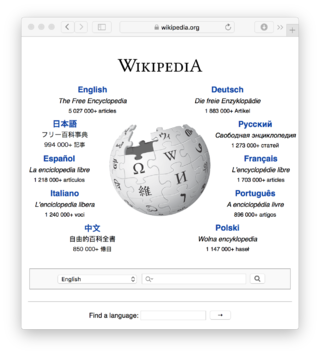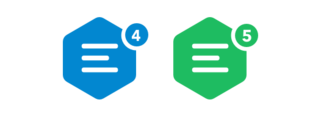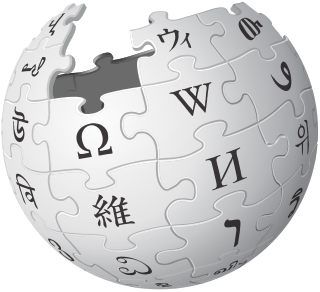
Konqueror is a free and open-source web browser and file manager that provides web access and file-viewer functionality for file systems. It forms a core part of the KDE Software Compilation. Developed by volunteers, Konqueror can run on most Unix-like operating systems. The KDE community licenses and distributes Konqueror under GNU GPL-2.0-or-later.

In computing, a plug-in is a software component that adds a specific feature to an existing computer program. When a program supports plug-ins, it enables customization.

A wiki is a form of online hypertext publication, collaboratively edited and managed by its own audience, using a web browser. A typical wiki contains multiple pages for the subjects or scope of the project, and could be either open to the public or limited to use within an organization for maintaining its internal knowledge base.

Wiki software is collaborative software that runs a wiki, which allows the users to create and collaboratively edit pages or entries via a web browser. A wiki system is usually a web application that runs on one or more web servers. The content, including previous revisions, is usually stored in either a file system or a database. Wikis are a type of web content management system, and the most commonly supported off-the-shelf software that web hosting facilities offer.

PmWiki is wiki software written by Patrick R. Michaud in the PHP programming language, and since January 2009 it is actively maintained by Petko Yotov under the oversight of Dr. Michaud.

MediaWiki is free and open-source wiki software originally developed by Magnus Manske for use on Wikipedia on January 25, 2002, and further improved by Lee Daniel Crocker, after which it has been coordinated by the Wikimedia Foundation. It powers several wiki hosting websites across the Internet, as well as most websites hosted by the Foundation including Wikipedia, Wiktionary, Wikimedia Commons, Wikiquote, Meta-Wiki and Wikidata, which define a large part of the set requirements for the software.
The following tables compare general and technical information for many wiki software packages.
An autolink is a hyperlink added automatically to a hypermedia document, after it has been authored or published. Automatic hyperlinking describes the process or the software feature that produces autolinks. Segments of the hypermedia are identified through a process of pattern matching. For example, in hypertext, the software could recognise textual patterns for street addresses, phone numbers, ISBNs, or URLs.
A web content management system is a software content management system (CMS) specifically for web content. It provides website authoring, collaboration, and administration tools that help users with little knowledge of web programming languages or markup languages create and manage website content. A WCMS provides the foundation for collaboration, providing users the ability to manage documents and output for multiple author editing and participation. Most systems use a content repository or a database to store page content, metadata, and other information assets the system needs.

TiddlyWiki is a personal wiki and a non-linear notebook for organising and sharing complex information. It is an open-source single page application wiki in the form of a single HTML file that includes CSS, JavaScript, embedded files such as images, and the text content. It is designed to be easy to customize and re-shape depending on application. It facilitates re-use of content by dividing it into small pieces called Tiddlers.

CKEditor is a WYSIWYG rich text editor which enables writing content directly inside of web pages or online applications. Its core code is written in JavaScript and it is developed by CKSource. CKEditor is available under open source and commercial licenses.
nofollow is a setting on a web page hyperlink that directs search engines not to use the link for page ranking calculations. It is specified in the page as a type of link relation; that is: <a rel="nofollow" ...>. Because search engines often calculate a site's importance according to the number of hyperlinks from other sites, the nofollow setting allows website authors to indicate that the presence of a link is not an endorsement of the target site's importance.

Zotero is a free and open-source reference management software to manage bibliographic data and related research materials, such as PDF files. Features include web browser integration, online syncing, generation of in-text citations, footnotes, and bibliographies, an integrated PDF reader and note editor, as well as integration with the word processors Microsoft Word, LibreOffice Writer, and Google Docs. It was originally created at the Center for History and New Media at George Mason University and, as of 2021, is developed by the non-profit Corporation for Digital Scholarship.
HCL Connections is a Web 2.0 enterprise social software application developed originally by IBM and acquired by HCL Technologies in July 2019. Connections is an enterprise-collaboration platform which aims to helps teams work more efficiently. Connections is part of HCL collaboration suite which also includes Notes / Domino, Sametime, Portal and Connections.

The history of wikis began in 1994, when Ward Cunningham gave the name "WikiWikiWeb" to the knowledge base, which ran on his company's website at c2.com, and the wiki software that powered it. The wiki went public in March 1995, the date used in anniversary celebrations of the wiki's origins. c2.com is thus the first true wiki, or a website with pages and links that can be easily edited via the browser, with a reliable version history for each page. He chose "WikiWikiWeb" as the name based on his memories of the "Wiki Wiki Shuttle" at Honolulu International Airport, and because "wiki" is the Hawaiian word for "quick".
Wikipedia has been studied extensively. Between 2001 and 2010, researchers published at least 1,746 peer-reviewed articles about the online encyclopedia. Such studies are greatly facilitated by the fact that Wikipedia's database can be downloaded without help from the site owner.

The Universal Edit Button is a browser extension that provides a green pencil icon in the address bar of a web browser that indicates that a web page on the World Wide Web is editable. It is similar to the orange "broadcast" RSS icon that indicates that there is a web feed available. Clicking the icon opens the edit window. It was invented by a collaborative team of wiki enthusiasts, including Ward Cunningham, Jack Herrick, and many others.

WikiBhasha is a multi-lingual content creation application for the online encyclopedia Wikipedia.
OnlyOffice, stylized as ONLYOFFICE, is a free software office suite and ecosystem of collaborative applications. It features online editors for text documents, spreadsheets, presentations, forms and PDFs, and the room-based collaborative platform.

The following outline is provided as an overview of and a topical guide to Wikipedia:












